Over the weekend I received an e-mail from a colleague who had recently given me a copy of story she'd been working on so I could give her some comments on it. This colleague got her Master's in Fine Arts (MFA) in Poetry writing and this was her first story attempt.
In the e-mail, my colleage told me not to bother anymore to read and comment on the story, that she'd shared it with a former professor and he'd told her, pretty much, that the story is rubbish and she should stick to poetry.
I hadn't read the story yet, but now I was really curious, so I got it out of my brief case and read it, and I could feel that familiar anger that has to do with the Tersteegs, the "everlasting no." My colleague's professor had given her awful advice, one of those cold, academic responses that make story-telling sound like some kind of specialized skill rather than an innate need.
So now because of the soul-crushing "advice" she'd received, my colleague was ready to give up on story writing all together. I told her I hope she continues to work on her story, that even if it never sees publication, it's still important that she writes it, that she lives with it for a while, that she gives it a chance before she strangles it while it's still in the cradle.
"Sure," I told my colleague. "There are techniques and skills that we acquire along the way, but not knowing those isn't a reason to stop writing stories!"
It's a lovely story, by the way, of a young woman's sexual awakening.
After going through this experience with my colleague, I read Robert Pinsky's column in the Washington Post about the poet Hart Crane, whose editor took him to task for some of the details he used in "Melville's Tomb."
At Melville's Tomb
by Hart Crane
Often beneath the wave, wide from this ledge
The dice of drowned men's bones he saw bequeath
An embassy. Their numbers as he watched,
Beat on the dusty shore and were obscured.
And wrecks passed without sound of bells,
The calyx of death's bounty giving back
A scattered chapter, livid hieroglyph,
The portent wound in corridors of shells.
Then in the circuit calm of one vast coil,
Its lashings charmed and malice reconciled,
Frosted eyes there were that lifted altars;
And silent answers crept across the stars.
Compass, quadrant and sextant contrive
No farther tides . . . High in the azure steeps
Monody shall not wake the mariner.
This fabulous shadow only the sea keeps.
Of Crane's poem, Pinsky says, "[It] is lucid in its overall sweep, and that lucidity of the whole depends upon dramatic mystery of texture and detail. In Crane's somberly ornamented tribute to his predecessor, Melville, human instruments of perception are effective but doomed by their limitations. The lifted eyes of religion, the sextant of navigation, Melville's genius: All are ways toward knowledge that contrive or discover meanings, despite their mortal limitations. In a word, they are tragic."
Crane's editor, though, (another Tersteeg?) didn't understand how a portent could possibly be wound in a shell, and so on. Pinsky writes, "Anyone who has ever tried to explain a joke, or a piece of music, or a passion, can sympathize with Crane's exasperated effort to illuminate the essential shadows. Most things people say have denotative as well as connotative meanings. Just as poems often involve quite strict, straightforward logic, even a purchase order may use one term rather than another just because it feels right."
Amen.
My colleague was ready to take her former professor's advice, she said, because she had placed him upon a pedestal. She is now coming to realize, I hope, that for her to elevate him this way is unrealistic, perhaps even dangerous to her art.
Of course, Crane didn't listen to his editor and change his poem. He knew what felt right. But people who are just beginning to explore a certain kind of writing are vulnerable to "advice." You have to be very careful about giving artists advice, because you can never know what beautiful, dramatic, tragic, unique thing you might be killing.
There are all sorts of tombs. There are the ones people's bodies are buried in, but there are also the tombs that our passions and our greatest ideas are buried in. We bury them ourselves, of course, but it's the Tersteegs who helped kill them in the first place. We can't let the Tersteegs define our art; they're not the boss of us. They don't know everything.
There's a threshold that no teacher or mentor can cross. Only the writer knows where she or he has to go. Neither the Tersteegs nor the Beatrices of the world can go there for us or tell us how to get across that threshold, either.
Saturday, September 23, 2006
Subscribe to:
Post Comments (Atom)
Pages
Dreaming
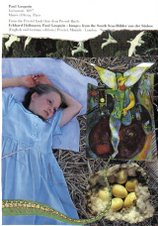
About Me

- Theresa Williams
- Northwest Ohio, United States
- "I was no better than dust, yet you cannot replace me. . . Take the soft dust in your hand--does it stir: does it sing? Has it lips and a heart? Does it open its eyes to the sun? Does it run, does it dream, does it burn with a secret, or tremble In terror of death? Or ache with tremendous decisions?. . ." --Conrad Aiken
Followers
Facebook Badge
Search This Blog
Favorite Lines
My Website
Epistle, by Archibald MacLeish
Visit my Channel at YouTube
Great Artists
www.flickr.com
This is a Flickr badge showing public photos from theresarrt7. Make your own badge here.
Fave Painting: Eden
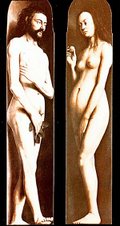
Fave Painting: The Three Ages of Man and Death

by Albrecht Dürer
From the First Chapter
The Secret of Hurricanes : That article in the Waterville Scout said it was Shake- spearean, all that fatalism that guides the Kennedys' lives. The likelihood of untimely death. Recently, another one died in his prime, John-John in an airplane. Not long before that, Bobby's boy. While playing football at high speeds on snow skis. Those Kennedys take some crazy chances. I prefer my own easy ways. Which isn't to say my life hasn't been Shake-spearean. By the time I was sixteen, my life was like the darkened stage at the end of Hamlet or Macbeth. All littered with corpses and treachery.
My Original Artwork: Triptych

Wishing
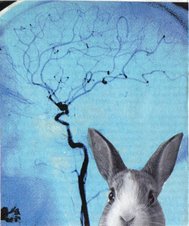
Little Deer
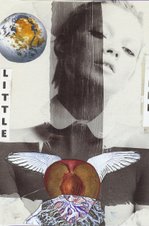
Transformation
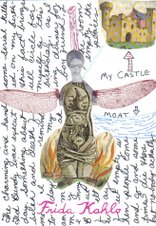
Looking Forward, Looking Back
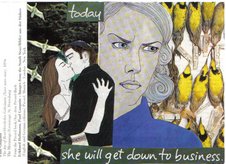
Blog Archive
-
▼
2006
(96)
-
▼
September
(20)
- Apocalyptic Thinking
- When Nations grow Old...
- The Permanent Realities of Every Thing
- Tombs
- Meant for Now
- Go Into a Wilderness
- We act just like the flower does in blooming
- Mysticism and Scholarship
- Nature is not humane; we should be like nature
- Spirit Matters
- Buffy, Pinsky, Gluck, and me
- Invocation
- Books are alive
- Expanding the reach of who you are
- "Into all abysses I still carry the blessings of m...
- Yes and No
- Didn't You Want to Be a Writer?
- The world is waiting...
- Making One of Opposites
- Sanctuary
-
▼
September
(20)
CURRENT MOON
Labels
- adolescence (1)
- Airstream (7)
- Alain de Botton (1)
- all nighters (2)
- Allen (1)
- altars (1)
- Angelus Silesius (2)
- animals (1)
- Annie Dillard (1)
- Antonio Machado (2)
- AOL Redux (1)
- April Fool (1)
- Archibald MacLeish (1)
- arts and crafts (55)
- Auden (1)
- awards (2)
- AWP (2)
- Bach (1)
- Basho (5)
- Beauty and the Beast (1)
- birthdays (1)
- blogs (5)
- boats (2)
- body (2)
- books (7)
- bookstores (1)
- Buddha (1)
- Buddha's Little Instruction Book (2)
- butterfly (4)
- buzzard (2)
- Capote (4)
- Carmel (1)
- Carson McCullers (1)
- cats (15)
- Charles Bukowski (1)
- Charles Simic (2)
- Christina Georgina Rossetti (1)
- church (2)
- confession (1)
- Conrad Aiken (1)
- cooking (5)
- crows (1)
- current events (2)
- D. H. Lawrence (3)
- death (6)
- Delmore Schwartz (4)
- detachment (1)
- dogs (7)
- domestic (3)
- dreams (21)
- Edward Munch (4)
- Edward Thomas (1)
- Eliot (3)
- Eliot's Waste Land (2)
- Emerson (2)
- Emily Dickinson (10)
- ephemera (1)
- Esalen (6)
- essay (3)
- Eugene O'Neill (3)
- Ezra Pound (1)
- F. Scott Fitzgerald (1)
- fairy tales (7)
- Fall (16)
- Famous Quotes (16)
- festivals (2)
- fire (5)
- Floreta (1)
- food (1)
- found notes etc. (1)
- found poem (2)
- fragments (86)
- Frida Kahlo (1)
- frogs-toads (4)
- Georg Trakl (1)
- gifts (1)
- Global Warming (1)
- Gluck (1)
- goats (1)
- Goodwill (1)
- Great lines of poetry (2)
- Haibun (15)
- haibun moleskine journal 2010 (2)
- Haiku (390)
- Hamlet (1)
- Hart Crane (4)
- Hayden Carruth (1)
- Henry Miller (1)
- holiday (12)
- Hyman Sobiloff (1)
- Icarus (1)
- ikkyu (5)
- Imagination (7)
- Ingmar Bergman (1)
- insect (2)
- inspiration (1)
- Issa (5)
- iTunes (1)
- Jack Kerouac (1)
- James Agee (2)
- James Dickey (5)
- James Wright (6)
- John Berryman (3)
- Joseph Campbell Meditation (2)
- journaling (1)
- Jung (1)
- Juniper Tree (1)
- Kafka (1)
- Lao Tzu (1)
- letters (1)
- light (1)
- Lorca (1)
- Lorine Niedecker (2)
- love (3)
- Lucille Clifton (1)
- Marco Polo Quarterly (1)
- Marianne Moore (1)
- Modern Poetry (14)
- moon (6)
- movies (20)
- Muriel Stuart (1)
- muse (3)
- music (8)
- Mystic (1)
- mythology (6)
- nature (3)
- New Yorker (2)
- Nietzsche (1)
- Northfork (2)
- November 12 (1)
- October (6)
- original artwork (21)
- original poem (53)
- Our Dog Buddha (6)
- Our Dog Sweet Pea (7)
- Our Yard (6)
- PAD 2009 (29)
- pad 2010 (30)
- Persephone (1)
- personal story (1)
- philosophy (1)
- Phoku (2)
- photographs (15)
- Picasso (2)
- Pilgrim at Tinker Creek (1)
- Pillow Book (5)
- Pinsky (2)
- plays (1)
- poem (11)
- poet-seeker (9)
- poet-seer (6)
- poetry (55)
- politics (1)
- poppies (2)
- presentations (1)
- Provincetown (51)
- Publications (new and forthcoming) (13)
- rain (4)
- Randall Jarrell (1)
- reading (6)
- recipes (1)
- Reciprocity (1)
- Richard Brautigan (3)
- Richard Wilbur (2)
- Rilke (5)
- river (5)
- river novel (1)
- rivers (12)
- Robert Frost (2)
- Robert Rauschenberg (1)
- Robert Sean Leonard (1)
- Robinson Jeffers (1)
- Rollo May (2)
- Rumi (1)
- Ryokan (1)
- Sexton (1)
- short stories (13)
- skeletons (2)
- sleet (1)
- snake (1)
- Snow (24)
- solitude (1)
- spider (2)
- spring (1)
- Stanley Kunitz (1)
- students (2)
- suffering (4)
- suicide (2)
- summer (20)
- Sylvia Plath (2)
- Talking Writing (1)
- Tao (3)
- teaching (32)
- television (4)
- the artist (2)
- The Bridge (3)
- The Letter Project (4)
- The Shining (1)
- Thelma and Louise (1)
- Theodore Roethke (16)
- Thomas Gospel (1)
- Thomas Hardy (1)
- toys (3)
- Transcendentalism (1)
- Trickster (2)
- Trudell (1)
- Ursula LeGuin (1)
- vacation (10)
- Vermont (6)
- Virginia Woolf (1)
- Vonnegut (2)
- Wallace Stevens (1)
- Walt Whitman (8)
- weather (7)
- website (3)
- what I'm reading (2)
- William Blake (2)
- William Butler Yeats (5)
- wind (3)
- wine (2)
- winter (24)
- wood (3)
- Writing (111)
- Zen (1)





8 comments:
Wow, thank you Theresa, beautiful and encouraging and forgiving. You are right, it is so easy to take the Teerstegs to heart and kill the passion before it has the chance to realize its full potential. There are many tombs like this in my past.
It is when I give myself the "everlasting no" that life and art are most difficult. I can be my own Teersteg. I can be my own tomb.
"Sure," I told my colleague. "There are techniques and skills that we acquire along the way, but not knowing those isn't a reason to stop writing stories!"
Theresa, I had a seventh grade teacher that said these words to me when I wrote stories that I thought were horrible. She said to never to stop writing. In this entry you remind me so much of her. Your colleague is very lucky to have you to read her story.
Another truly profound statement that you made, reminded me of myself in college as I fought for the rights or rather respect of less experienced students...
You also wrote:
"But people who are just beginning to explore a certain kind of writing are vulnerable to "advice." You have to be very careful about giving artists advice, because you can never know what beautiful, dramatic, tragic, unique thing you might be killing.
I agree wholeheartedly! A new artist is like a rose bud waiting to bloom. Without food and water it will never become the beautiful rose it was meant to be. In my mind, you are the food and water for many of us.
Thank you for being such a wonderful teacher and caring woman. I appreciate you greatly!
Hugs,
T
Amen.
Your words warm me to the core of my creative heart. A Teersteg in my life advised me several months ago that I should write only pieces like the three he liked on my blog and give up all the rest of my boring whining. I had imagined all the Teersteg's to be in the past, so the criticism caught me off guard.
Now I wear Teersteg block everyday along with my sunscreen. There are so many ways to get burned -- and silenced.
"If we listened to our intellect, we'd never have a love affair. We'd never have a friendship. We'd never go into business, because we'd be too cynical. Well, that's nonsense. You've got to jump off cliffs all the time and build your wings on the way down."
Annie Dillard
My heart is in my throat. The best teacher is wise, instructs through patience, truth, leavened with heaping helpings of inspiration and compassion. The next step is to
confront the internal critic, negotiate peace, and continue to risk no matter what.
Gretchen
"They're not the boss of us." Indeed! I enjoyed this entry greatly, and it reminds me once more of what an outstanding teacher and mentor YOU are.
Yes, Theresa, you are the best anti-Teersteg I have ever known. When I think there is just no point in trying anymore, all I have to do is turn to your words in this blog. Teagrapple
Theresa, I`ve really enjoyed reading this. Sometimes, I visit here and hope for a poem, a snippet of your work. And you say " Hey, I`ll show you even more! ".
V
Post a Comment